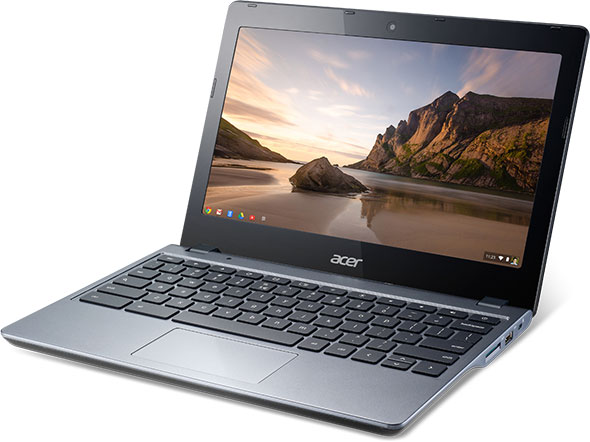Intel and Acer Start Chromebook Seed Program for K-12 Schools
Chromebooks are gaining traction because they're relatively inexpensive, lightweight and portable, and capable of basic computing chores. They're especially well suited for students of various ages -- kids and teens can use Chromebooks to research their reports on the Internet, type up documents, and more. With all that in mind, Acer and Intel are offering K-12 schools a chance to pilot Google's Chrome OS with a free 30-day trial of the Acer C720 Chromebook.
There's an application to fill out for for K-12 schools interested in participating in the seed program, and by entering the program, the customer agrees to have two short conference calls with Acer. After the first call, Acer will send out its C720-2103 Chromebook, and 30 days after delivery, there will be a second conference call to discuss their impressions of the C720. From there, the school can discuss long-term use or simply return the system to Acer and owe nothing.

The C720-2103 sports an Intel Celeron 2955U processor based on Haswell, 2GB of DDR3L RAM, 16GB solid state drive, 802.11n Wi-Fi, Bluetooth 4.0, USB 3.0 and 2.0 ports (one each), and a 3-cell Li-Polymer battery. According to Acer's tests, there are several advantages to an Intel-based Chromebook versus ones running ARM hardware.
"As more Chromebook models enter the market, it's becoming hardware for schools to choose the right one. We put on our student hats, and put two representative Chromebooks through scenarios that included tasks such as watching a TED-Ed video and taking notes," Acer explains. "We also looked at how long the two Chromebooks could keep running without a charge."
The result of those tests is that the Intel-powered Chromebook lasted over 57 percent longer unplugged than the ARM-based Chromebook, while also delivering up to 50 percent less waiting in four student scenarios.
There's an application to fill out for for K-12 schools interested in participating in the seed program, and by entering the program, the customer agrees to have two short conference calls with Acer. After the first call, Acer will send out its C720-2103 Chromebook, and 30 days after delivery, there will be a second conference call to discuss their impressions of the C720. From there, the school can discuss long-term use or simply return the system to Acer and owe nothing.

The C720-2103 sports an Intel Celeron 2955U processor based on Haswell, 2GB of DDR3L RAM, 16GB solid state drive, 802.11n Wi-Fi, Bluetooth 4.0, USB 3.0 and 2.0 ports (one each), and a 3-cell Li-Polymer battery. According to Acer's tests, there are several advantages to an Intel-based Chromebook versus ones running ARM hardware.
"As more Chromebook models enter the market, it's becoming hardware for schools to choose the right one. We put on our student hats, and put two representative Chromebooks through scenarios that included tasks such as watching a TED-Ed video and taking notes," Acer explains. "We also looked at how long the two Chromebooks could keep running without a charge."
The result of those tests is that the Intel-powered Chromebook lasted over 57 percent longer unplugged than the ARM-based Chromebook, while also delivering up to 50 percent less waiting in four student scenarios.

